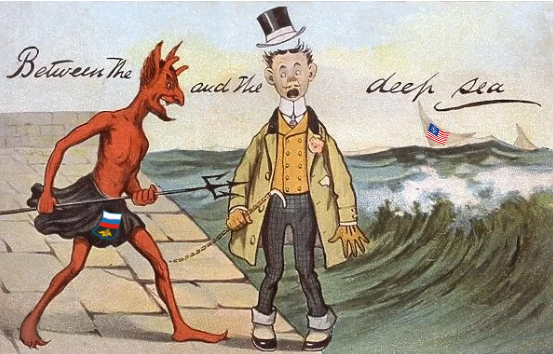

by John Helmer, Moscow
@bears_with
It was the US strategy for dismembering the Soviet Union, and then destroying the surviving Russian part, to install individual politicians and formations of economic assets controlled by Washington. The first chosen was Boris Yeltsin; then his prime minister Yegor Gaidar and chief of staff Anatoly Chubais; and then the oligarchs who emerged from the 1996 presidential election campaign controlling almost everything that counted.
Yeltsin’s removal and replacement by Vladimir Putin in 2000 was another US operation through the oligarchs.
When they began to lose control of the reviving Russian military, and the Army took tighter control of Putin, the US methods for the destruction of Russia accelerated across the border with the Ukraine. As this US military strategy has now led to the near-total destruction of the Ukraine, and of everything the US and NATO have put on the battlefield, there remains for the US its last Russian card to play. This is the oligarch card.
The sanctions war began in March 2014 and has been running against Russia’s strategic economic assets and its technological capacities to wage war against the US. It has aimed at the Russian oligarchs, not because they are Putin’s “cronies” – as the US Treasury regularly refers to them — but to compel them to take sides with Putin and the Army, or against them. This is the oligarch trap – and for the time being only a few have fallen into it: Mikhail Fridman and his partners, Pyotr Aven and Alexei Kuzmichev of the Letter One group of banks, supermarkets, energy, and communications; Oleg Tinkov of the Tinkoff bank; and Arkady Volozh of the Yandex group are the most obvious casualties. Oleg Deripaska isn’t more loyal to the state than to the oligarchy, but he hasn’t fallen into the American trap because US sanctions against him began much earlier.
At Putin’s annual dinner for the oligarchs, the president appears to cater, they appear to kowtow, in a public ceremony of loyalty which means less of that, and more of favour than either of them lets on. In this year’s ceremony, there were eighty at the table – three state officials plus Putin, and 76 oligarchs, the largest number in the nine-year record of the dinner. But unlike the earlier dinners, the Kremlin and the oligarchs are keeping secret not only what was said, but also the names of the invitees. For the oligarchs who are already sanctioned by the US and the NATO allies, this secrecy is no benefit. The secrecy instead is for the domestic political purpose of concealing the terms on which the oligarchs will continue to dictate the state’s economic priorities, and prevent the state recovering the assets the oligarchs have been stealing from the beginning.
Putin began the practice of publicly hosting the oligarchs at an annual Christmas dinner on December 19, 2014. Before then, their meetings were undisclosed or camouflaged as having official purpose.
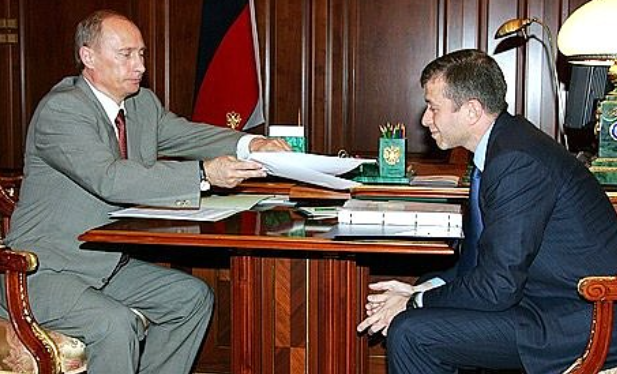
Putin meets Roman Abramovich on May 27, 2005, when Abramovich was officially governor of Chukotka. There is no other Kremlin record of Putin and Abramovich meeting together.
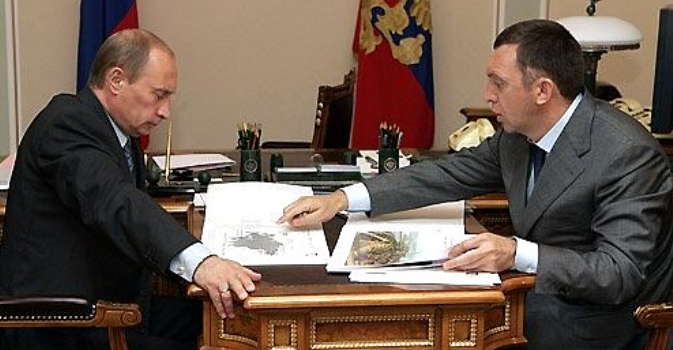
The last Kremlin record of Putin meeting Oleg Deripaska to “discuss work and development plans for the GAZ Group and Russian Aluminium (RUSAL). GAZ Group is a supplier of medical vehicles as part of the Healthcare national project. Speaking about the group’s car-making plans, Mr Deripaska told the President that a decision has been taken to transform GAZ into an international automobile manufacturing business.” Putin and Deripaska agreed in secret for Deripaska to attempt a takeover of a major European car manufacturer. This led to the ill-fated scheme to acquire General Motors’ Opel division in Germany and Vauxhall in the UK, bribing Hillary Clinton to agree. She took the money, then reversed her consent. That story is told in The Man Who Knows Too Much About Russia, Chapter 6. According to the Kremlin record, Mikhail Fridman’s only face-to-face presidential meetings were with President Dmitry Medvedev in 2008-2009. Fridman was in the group of British Petroleum officials who met with Putin after they had formed their TNK-BP joint venture in 2003, then the largest foreign investment in Russia. The last of those meetings was in 2007.
The ceremony of the oligarch dinners was Putin’s answer to the opening of the war in the Ukraine and the start of the sanctions war; it was a message for Washington.
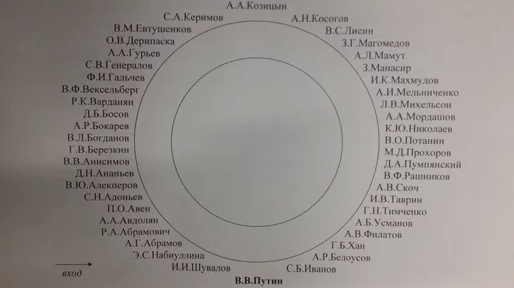
Original source: http://tvrain.ru
The Kremlin was originally reluctant to confirm the names around the table – four officials, forty-one oligarchs.
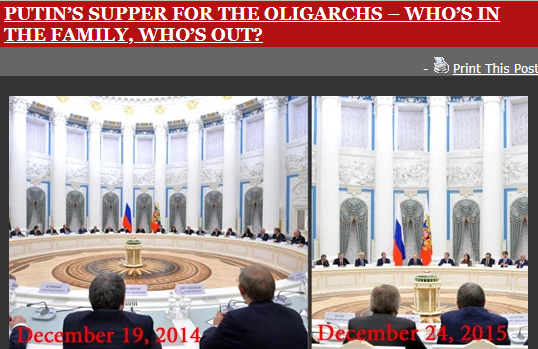
Source: https://johnhelmer.net/
The next year, 2015, the dinner was held on December 26. There were 46 invitees this time – five more than the year before. Putin claimed in the Kremlin transcript that he was offering an amnesty on all capital returned to Russia from abroad – that was amnesty from tax penalties and prosecution for theft and fraud. The oligarchs ignored him, and Putin desisted; capital amnesty was a failure. Then Putin publicly offered deoffshorization – incentives to reregister the corporate entities through which the oligarchs invested their Russian corporate profits and capital stripping in tax havens and private wealth schemes. But deoffshorization was another failure, one which Putin has never analysed aloud for the oligarchs or the Russian people to understand. For the latter, he didn’t need to. In polls repeated over the years, it is the view of the majority of Russians that the oligarchs are personally close to the president, and control what he does. What he says doesn’t matter.
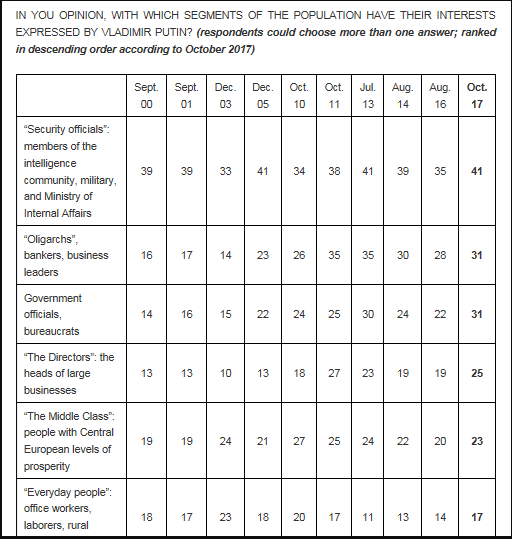
Source: Levada poll, December 12, 2017 . For analysis, click to read.
This Putin has made obvious by what he has hidden from the record of the oligarch dinners. Missing from both the 2014 and 2015 guest lists are three names identified on US and European Union (EU) sanctions lists as oligarch-sized businessmen whom the US Treasury believes to be closest personally to Putin — the Rotenberg brothers, Arkady and Boris; and St. Petersburg banker Yury Kovalchuk. They were missing in 2016; Fridman was also missing. That year at dinner the total of oligarchs and also smaller businessmen came to 62.
In December 2017 Putin was running for re-election and didn’t want to appear to the voters to be courting the oligarchs and mobilising their workforces and payrolls to get out the vote. That is exactly what Russian voters believed. At the time, Russian political analysts reported Putin didn’t want to appear at the start of the election campaign in the company of the oligarchs. It was also the reason Putin did not want to meet Deripaska at his GAZ automobile plant for the election campaign launch – and why Deripaska’s men would not admit it. And so the dinner for that year was cancelled. But days later, the Kremlin had a change of mind, and it was rescheduled. This time 56 were invited to the table; the Rotenbergs, Kovalchuk and Fridman were missing again.
In 2018 there was no dinner at all, In 2019 there was another last-minute change of Kremlin mind, and 60 oligarchs were summoned at the last minute for the ceremony on December 25. A week earlier Putin had told a session of the combined houses of parliament: “We have overcome the situation when certain powers in the government were essentially usurped by oligarch clans.” This has never been true although the members of the clans have changed. Fridman’s appearance at the 2019 dinner was proof.
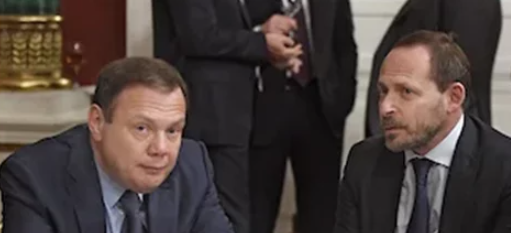
(Left to right) Mikhail Fridman and Arkady Volozh at the December 2019 dinner. Both had been missing before. Source: https://johnhelmer.net
This year, earlier than usual, the latest ceremony for the oligarchs took place in the dark of night on November 15, and for the first time outside the Kremlin, at the president’s country residence at Novo-Ogarevo. The Kremlin record of Putin’s official programme on November 15 and 16 omits the meeting entirely; there are no official photographs of the president and his guests at the meeting.
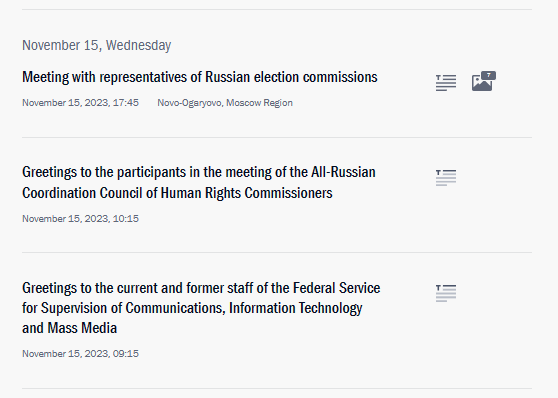
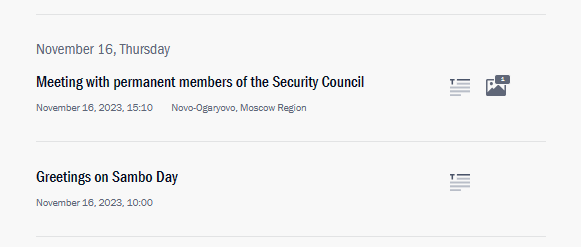
Source: http://en.kremlin.ru/
At Putin’s session with the Security Council following the oligarchs’ meeting, the focus was on international, not domestic issues, according to the Kremlin communiqué. “Several major international events have taken place recently. We took part in them and followed up by adopting certain decisions. I suggest that we review their current implementation. The Foreign Minister will report on this item. Mr Lavrov, go ahead, please.” When asked to explain the Kremlin secrecy over the oligarchs’ meeting, and explicitly whether Fridman was one of the invitees, Kremlin spokesman Dmitry Peskov said: “We deliberately did not give a list of participants. For obvious reasons, to make them comfortable. And it was planned to hold the meeting behind closed doors so that a meaningful conversation would take place so that they could all talk calmly.”
The Russian business press, which has usually reported the meetings from their oligarch sources, didn’t learn what had taken place for at least twenty-four hours. According to Forbes Russia and Vedomosti, “Vladimir Putin’s meeting with business representatives took place at Novo-Ogarevo late in the evening on November 15 and ended around midnight…In total, about 80 people took part in the meeting, including presidential aide Maxim Oreshkin, First Deputy Prime Minister Andrei Belousov, Minister of Economic Development Maxim Reshetnikov, as well as Russian Union of Entrepreneurs and Industrialists President Alexander Shokhin, the general directors of Russian Railways Oleg Belozerov and Kamaz Sergei Kogogin, head of Sberbank German Gref, etc. According to Vedomosti, the meeting began at about 22:00 Moscow time and lasted until almost midnight. The businessmen expressed concerns about the results of privatisation and proposed to raise taxes, Vedomosti found out At the meeting with President Vladimir Putin, business representatives mainly talked about fears about the revision of the results of privatisation and expressed their willingness to raise taxes in exchange for long-term predictability of tax policy. This was reported by Vedomosti with reference to its sources. According to one of the interlocutors, business ‘cannot but be concerned’ about the number of large companies that have been nationalised over the past year and a half. He called this number frightening, despite the fact that everyone understands the context and nuances of each case.”
“The second issue which worried the business community was related to the increase in the fiscal burden. The interlocutor, familiar with the report of the president of the Russian Union of Industrialists and Entrepreneurs [RSPP is the Russian acronym, RUIE the English one] Alexander Shokhin, said that, according to him, business is ready to increase the income tax rate, but in exchange for guarantees of a stable and predictable burden on other taxes and duties, as well as the provision of tax deductions for investment.”
“In addition, the business representatives discussed with Putin ensuring non-disclosure of information about residents of special administrative districts and their results, as well as preserving preferences for those who are just starting to transfer business from abroad. According to the newspaper, the proposals and concerns of business were heard, including business concerns about the revision of the results of privatisation; according to a senior federal official, the authorities tried to dispel [the oligarchs’ concerns] completely. The proposal to raise the income tax in exchange for investments and stability was also heard, says another interlocutor. Now the business is waiting for the president’s instructions following the meeting.”
“Earlier, the press secretary of the president Dmitry Peskov said that [the meeting] was also about the transfer of companies to Russian jurisdiction. The ‘overwhelming majority’ of businessmen who participated in the meeting with Putin “have faced illegal treatment abroad,’ Peskov claims. In this regard, work is now underway so that businesses do not face problems when transferring companies to Russia and ‘open new jobs, create new enterprises, invest the money they earn here in their homeland.’’
This is not the first time in such a forum that the oligarchs have told Putin they are opposed to nationalisation of the state assets which were transferred during the Yeltsin period and represent the cornerstones of their own fortunes. Just hours after the start of the Special Military Operation in February 2022, Putin told a session of the RUIE that he would protect their domestic assets and compensate them for their losses to US and NATO sanctions and seizures abroad by a tit-for-tat exchange with foreign corporate assets in Russia. He repeated his assurances to Shokhin at a face-to-face meeting in the Kremlin on March 2, 2022.
Putin and Shokhin went further. By April of this year, it became clear the oligarchs were demanding nationalisation of their liabilities to the state, and continuing privatisation of their profits.
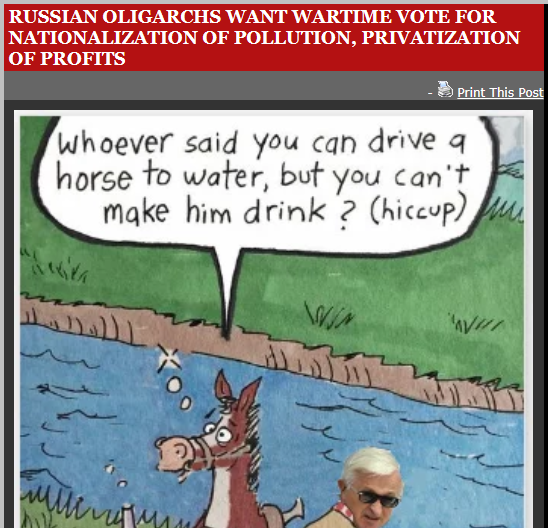
Source: https://johnhelmer.net/
Then two months ago on September 12, Putin publicly defended the two most hated state officials, Anatoly Chubais and Alexei Kudrin, fabricators of the oligarch system in the 1990s and defenders ever since. He also defended Arkady Volozh’s flight to Israel and his public criticism of the war against the US and Ukraine.
Putin was then asked to say if he plans to renationalise oligarch assets. “[Igor Doronov] There is now an idea of a new privatisation in Russia, but the topic that is now very much worrying business and is being discussed here, on the sidelines of the WEF [World Economic Forum, Davos], and in Moscow they are talking about it is deprivation [confiscation], when the state, as it were, can be said, takes assets in its favour. And there are already several such cases. Businessmen say that we do not understand: have any rules changed or how do we look to the future in this situation? The topic is quite acute. How would you comment on it?
“Vladimir Putin: No, there is no deprivation [confiscation] planned, there will be no deprivation, I can tell you that for sure. The fact that the prosecutor’s office is actively working in certain areas, for individual companies – law enforcement agencies have the right to assess what is happening in the economy in specific cases, but this is not related to any decisions about deprivation. This will not happen, and [Prosecutor General] Igor Viktorovich [Krasnov] knows my position. Igor Viktorovich?”
Until the US and the NATO states escalated their threats to seize Russian oligarch assets in what had been their safe havens abroad, every attempt at repatriation of the oligarchs’ capital to Russia had failed. Now, however, between the twin threats of foreign confiscation and domestic renationalisation, the oligarchs are pressing the president to protect their special position in the domestic economy. Putin has now repeated his September reassurances. “ ‘We had a thorough conversation,’ Putin spokesman Peskov told Tass. ‘A number of issues were formulated through the RSPP. There were various speeches – both business spoke, and representatives of the economic bloc of the government spoke,’ Peskov added. Peskov said that Putin at a meeting with representatives of large Russian businesses discussed the transfer of some companies to Russian jurisdiction. ‘The speech was about possible steps to improve the investment attractiveness of our economy, to create more than competitive conditions for completing the process of transferring companies here,’ the Kremlin spokesman said… According to the press secretary of the President of the Russian Federation, the meeting was held precisely so that this process would be well-established, so that business would not face problems and transfer its companies to Russia, opening new enterprises in it and creating new jobs. ‘That’s what, in fact, it was about, Peskov explained.”
Redomiciliation without nationalisation and no new taxation – these are the oligarchs’ codewords for continuing the 25-year old system of domestic economic control despite wartime mobilisation and the removal of Chubais and Kudrin from their former Kremlin influence. According to Peskov, “the process of redomicilation should be absolutely perfect, so that business does not face problems, and so that business transfers its companies here, creates new jobs, opens new enterprises, invests and earns money here, at home.” Shokhin has also revealed that the oligarchs want to grandfather their old tax evasion and offshore holding company schemes in the form of Putin’s personal guarantee that their net domestic tax rate will not be raised.
The Kremlin’s silence on this oligarch agenda is one thing. The silence of the domestic political opposition is quite another. Sergei Glazyev, a former Yeltsin-era minister, Kremlin economic policy advisor, and current state job-holder, refuses point-blank to comment. Glazyev’s record for opposition policymaking in theory but political failure in practice can be followed in this archive.
For the Russian Communist Party, spokesman Alexander Yuschenko said by telephone that the party “wasn’t going to comment on [the oligarchs’] meeting at the moment and [readers] can always watch for official articles on the party website.”
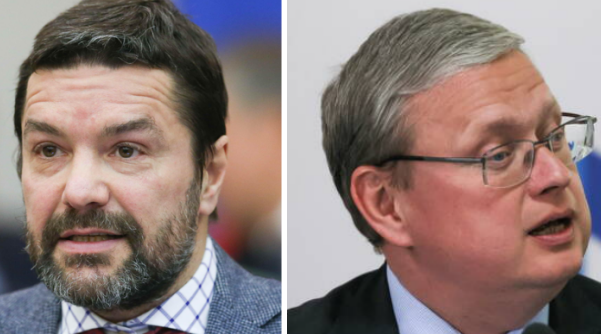
Left, Alexander Yuschenko, spokesman for the Russian Communist Party; right, Mikhail Delyagin. On how the Communiast Party has responded to the Prigozhin mutiny in June, read this.
Mikhail Delyagin gave a careful, ironic response to the telephoned questions. Delyagin is chairman of the State Duma Committee on Economic Policy and a fellow member with Glazyev of the Anti-crisis Expert Council. “The oligarchs,” Delyagin said, “were speaking about the necessity to create ‘a new business climate in Russia’ – that’s the one they have been trying to create since 1994. But the oligarchs themselves are the main reason why this business climate has not been built, and also why they are holding their finances offshore.”
“I suppose [the November 15 meeting] was about the re-registration of business here in Russia in our own offshore zones. As I have asked in MinEk [Ministry of Economic Development], nowadays there are 247 companies which have transferred their registration into Russia. But nobody knows how many are left abroad. It’s useless to speak about new preferences for business if they aren’t going to move, And I also suppose that because President Putin is such a kind person, the oligarchs have received a message about new preferences for them in the event they move to Russia.”
A veteran Moscow commodity trader comments: “What is happening is a carrot-and-stick display. Elections are coming, so the message is — say and do nothing to undermine VVP [Vladimir Vladimirovich Putin] and he will create conditions for you to keep your business and take over what Western companies have left. But do not complain too much. Those who go too far will get the Prigozhin treatment. So for everybody, there can be no wavering, no vacillation on this now.”
The paradox of this moment – unsaid publicly, acknowledged privately — is that never has oligarch rule of Russian economy been under greater threat, and the oligarchs politically less capable of resisting. On the other hand, the president intends by his dinner ceremony to reassure the oligarchs that he isn’t planning any threat to their domestic survival. They understand that, domestically, apart from Putin, there is no other threat. The organised political opposition to oligarch rule has never been weaker.











Leave a Reply